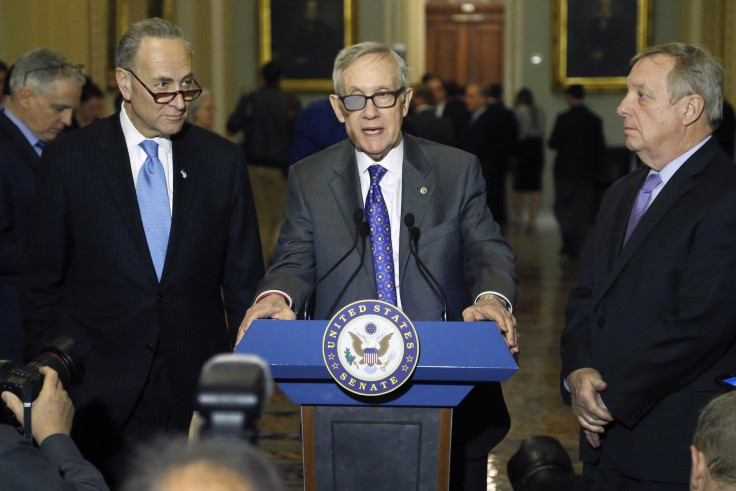Harry Reid Retirement: Who Will Be The Next Senate Democratic Leader?

This story has been updated.
UPDATE 12:30 p.m. EDT: Sen. Harry Reid told The Washington Post that Sen. Chuck Schumer should succeed him as Democratic leader.
WASHINGTON -- Senate Minority Leader Harry Reid’s surprise announcement Friday morning that he won’t run for re-election didn’t set off behind-the-scenes jockeying to replace him. That maneuvering has already been in place for years. But with Reid’s decision official, the next 22 months will feature a tangle among top Democrats for the leadership.
There are three clear contenders -- Sens. Chuck Schumer of New York, Dick Durbin of Illinois and Patty Murray of Washington. Each already holds a leadership role within the Democratic caucus. Durbin is the Democratic whip. Schumer is the vice chairman of the caucus. And Murray carries the title of secretary, but is better-known in her previous role as chairwoman of the Budget Committee.
Other senators could toss their hats in the ring, but it's unlikely any would be successful. The Senate remains a body that largely favors seniority and tradition. And Schumer, Durbin and Murray collectively have more than 56 years in the Senate. “I don’t think it’s unreasonable to expect a dark horse bid from one of the more conservative or liberal members of the caucus; I think it will be done to make a point,” a Democratic aide said. “I think that will end up being a really big distraction from where people’s focus really needs to be.”
The 2016 election and how the Senate functions for the next two years -- during which Reid, of Nevada, will retain the role of minority leader -- will play a large role in deciding who ultimately gets the job. Which party controls the Senate and the White House will be important factors. And whether Democrats are looking for someone who will keep up the fight against Republicans or someone who will work to broker deals will be an important element in whom they select.
As it stands now, Schumer is the favorite. He picked up Reid's endorsement for the job shortly after the outgoing leader announced his retirement. He’s spent years positioning himself as the successor to Reid. He has worked behind the scenes with fellow Democrats on issues for their offices. He’s worked the Democratic caucus like his own constituency.
Schumer, who was first elected in 1998, would be the most brash of all the likely options. He takes a more aggressive political approach. He worked on negotiating a failed gun control bill in 2013 along with Pennsylvania Republican Sen. Pat Toomey. But the two weren’t able to rally enough support to pass the landmark legislation.
Schumer, invulnerable at home, has a track record of success on the national electoral side. He was a strong factor in helping Democrats win control of the Senate in 2006 as chairman of the Democratic Senatorial Campaign Committee. And he has been in charge of crafting the caucus’ messaging, which has at times taken an aggressive approach to opposing Republicans.
It was clear that Reid’s announcement didn’t take Schumer by surprise. He was the first member to release a statement on the news, although to be fair, most senators might have still been asleep when the news broke slightly before 8 a.m. since they were voting until 3 a.m. that morning.
Schumer’s biggest competition will be Durbin, who is described as less politically charged than Schumer and more of a policy wonk. When Reid missed sessions in January because of his injuries, Durbin filled in for the minority leader, delivering speeches on the floor in opposition to Majority Leader Mitch McConnell, R-Ky. Durbin has been the whip since 2005, a position that has made him responsible for rounding up the votes needed on key legislation like the Affordable Care Act and key funding bills. Durbin, first elected to the Senate in 1996, has been active on a number of issues, including foreign policy issues and as an appropriator.
Durbin has been quieter in his efforts to become Reid’s successor. But now that the job is available, its expected that the two men will become more public in their efforts to advance. “I think we’ve been seeing this for a long time already. I think there has been that positioning for years and certainly in the last year or two,” a Democratic aide said. “There will be at least an increased intensity; at least it will be a little more obvious that is the intention.”
The third viable option is Murray, who of the three likely Reid replacements has been in the Senate the longest. She was first elected in 1992. Murray would also be the first woman to lead either party in the Senate.
Murray was able to negotiate one of the biggest fiscal compromises in Congress in the last several years. Working with Rep. Paul Ryan, R-Wis., the House Budget Committee chairman, she reached a spending compromise that allowed Congress to avoid the risk of another government shutdown for two years. The Murray-Ryan deal gained bipartisan praise. The decision to have Murray serve as the Budget Committee chairwoman was seen as an effort to boost her name recognition and position her for a future leadership position. Many speculated at the time that Reid was trying to give her a boost as a possible successor.
But Murray is the least likely to campaign for the job. She has played the role of compromise builder, not behind-the-scenes campaigner. But that doesn’t mean it’s impossible for her to win.
© Copyright IBTimes 2024. All rights reserved.





















